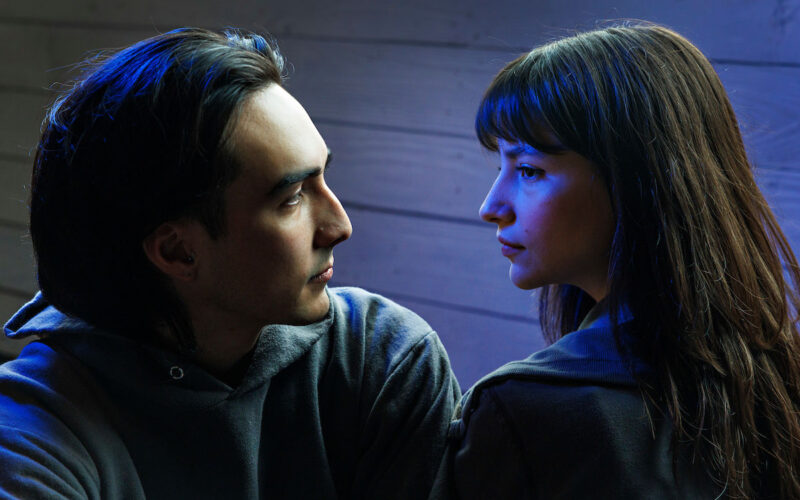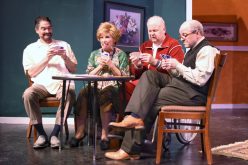BECCA MARTIN-BROWN
bmartin@nwaonline.com
Just as there is no rest for undocumented immigrants trying to keep a foothold in the United States, there is no rest for audiences experiencing Martyna Majok’s “Sanctuary City.”
“The first half of ‘Sanctuary City,’ about 50 minutes, is written in shards of scenes — some gleeful, some sad, all trenchant — that come flying off the stage in short, jagged bursts of a few seconds each,” critic Jesse Green wrote in The New York Times. “As in plays like Caryl Churchill’s ‘Love and Information’ and Nick Payne’s ‘Constellations,’ these are often deliberately disorienting, changing subject suddenly and delivered out of order.
“By challenging the audience to assemble the story, she is forcing us into her characters’ heads as they piece together their lives under the pressure of constant emergency.”
It is not an easy place to spend the evening. But it is a rewarding one.
“Sanctuary City,” on stage now at TheatreSquared, has just two principal characters — a boy and a girl, both teenagers, known only as “B” and “G” — and it might be tempting at the beginning to dismiss the play as the same old love story, set this time in Newark, N.J.
It IS a love story — although whether they’re in love with each other is still up in the air. But the context is so much bigger than that. “Sanctuary City” is a story about basic human rights — life, liberty and the pursuit of happiness.
But how do you live if your boss takes your tips, knowing you can’t report him because it might get you deported? How do you set yourself free from an abusive relationship if you don’t dare call the police? How do you pursue happiness — in this case, a college education — if you can’t get aid or scholarships because you’re not in this country legally, even though you’ve lived here most of your 17 years of life?
“This show brings the reality of where we are right now,” says Ana Miramontes, who plays “G.” “I hope this show can bring awareness of how impossible the immigration system is, and how it is designed to keep people out. I hope it also empowers the people that come to see it to take action and become advocates for immigrant rights. One can only dream.”
“I think that by shining a light on specific experiences that are potentially different from your own is the best way to realize how similar we are,” adds Brennan Urbi, who plays “B.” “Ultimately it is about human issues like loneliness, desire to be loved, desire to be accepted, joy, persistence — I could go on, but these are things that everyone can understand.”
The play opens with G showing up at B’s window. She’s been beaten up by her mother’s boyfriend — again — and needs a place to take shelter.
“Technically, a sanctuary city is a city where law enforcement will limit cooperation with federal immigration enforcement agents,” explains Miramontes. “In this play, G and B, who are undocumented, live in a sanctuary city, but they also become each other’s sanctuary, so the name of the play works in more than one way. Life is hard for them, but they find refuge and hope in each other. ….”
From that opening, the play leaps through memories that span a couple of years in the lives of B and G.
“Throughout [Part 1], we jump time somewhere around 80 times, shifting back and forth between different memories,” says Urbi. “Each individual scene tells a piece of the story, and it’s not until you’ve seen all the pieces that you start to get an idea of the full picture. It feels like you are flipping channels on B and G’s memories, but you’re not sure who has the remote. Then, in Part 2, Majok flips everything on its head with a fun surprise.” (Part 2 is the only time you see the character of Henry, played at T2 by Nima Rakhshanifar.)
“Something that really moved me was how these teenagers are stuck with no status, and living their lives in constant fear,” says director Esteban Arevalo Ibanez (“Miss You Like Hell”). “And yet they constantly use humor, facing challenges together with a laugh, and take care of each other when things get harsh. I found hope in this kindness and empathy …
“Martyna Majok always refers to her plays as ‘hear me out plays,’” Ibanez adds, “because she brings the immigrant stories to the stage, and hopes people will meet her in the middle to listen and, by doing so, become more empathetic. The end goal would be for them to become just a historical account of something long gone — but not yet.”
FAQ
‘Sanctuary City’
WHEN — 7:30 p.m. Tuesday-Friday; 2 & 7:30 p.m. Saturday; 2 p.m. Sunday, through April 9
WHERE — TheatreSquared, 477 W. Spring St. in Fayetteville
COST — $20-$54
INFO — 777-7477 or theatre2.org.










